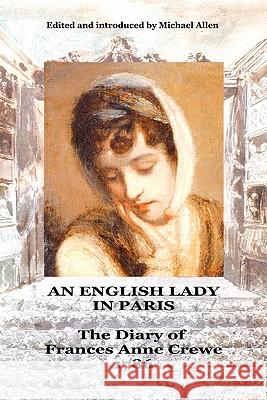An English Lady in Paris: The Diary of Frances Anne Crewe 1786 » książka
An English Lady in Paris: The Diary of Frances Anne Crewe 1786
ISBN-13: 9780955249020 / Angielski / Miękka / 2011 / 260 str.
EXCERPTS FROM REVIEWS OF AN ENGLISH LADY IN PARIS Eighteenth-century personalities, scandal, and gossip come alive on these pages as do scientific crazes (mesmerism), political intrigues, and public spectacles. The theatre and dramatic spectacles are described at length, as are literary debates in the salons, and, of course, the fashions. Thoughtful comparisons are made between French and English social customs and] a certain amount of John Bullishness is but natural. In these restless years just before the revolution, even a visitor to Paris could observe the discontent and unease that penetrated even the most privileged circles. Scholars and enthusiasts of the period will be grateful for Michael Allen's notes which] contain a gold-mine of information, which could otherwise be gleaned only with great difficulty through archival research. On better-known subjects, it is remarkable how deftly he can pick out the highlights and present them with an assured and easy touch; the thoroughness with which he has conducted his research adds considerably to the value of this volume. An English Lady in Paris is the kind of book that can be read with pleasure, and then kept within reach on the shelf, for frequent consultation. It provides a convincing snapshot of an age, a society, and a personality who shone with brilliance in its midst. Lorna Clark, The Burney Letter Every researcher's dream is to discover a diary from an earlier time. The diary of Frances Crewe, while not hidden in an attic trunk, did languish on the shelf of the British Library (cited only occasionally) until being brought into the light of day by its editor, Michael Allen. It contains no shocking revelations, but it is an important book that delineates the experiences of a famous woman living in 1786. Allen's notes, which take up half the book, are fascinating reading in themselves. Crewe was eager to visit Versailles and to see the King and Queen, and her accounts show how easily the English mingled with the French at the Palace. This picture of France just three years before the Revolution is revealing. Mrs. Crewe was a close friend of Edmund Burke, and she eventually agreed with him rather than Fox on the question of French politics. During the Revolutionary period, she worked with Frances Burney to help French emigres in England. But in 1786, visits to Paris meant trips to the theater, the opera, and literary parties. While it is unlikely that there will be a movie made based on the life of Frances Crewe, her famous friend Georgiana, Duchess of Devonshire was the subject of the major motion picture The Duchess (Paramount, 2008), which starred Keira Knightley in the title role. That film and this book both demonstrate our desire to learn about and imagine what women's lives were like in the eighteenth century. Deborah Kennedy, 1650-1850: Ideas, Aesthetics and Inquiries The document is important not only to historians of English literature and culture but also to those interested in Paris in the years immediately preceding the revolution. Allen's footnotes on the figures, places, and events mentioned in the diary are scholarly and meticulous, drawn from contemporary accounts and later scholarship. His introduction and appendixes, on the other hand, are aimed at nonspecialists and less experienced readers. Recommended. Upper-division undergraduates through faculty; general readers. C. S. Vilmar, Choice"











